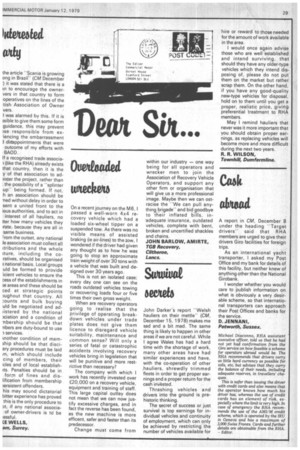On a recent journey on the M6. I passed a
Page 31

If you've noticed an error in this article please click here to report it so we can fix it.
well-worn 4x4 recovery vehicle which had a loaded six-wheel tipper on a suspended tow. As there was no visible means of assisted braking (ie air-lines) to the sow, I wondered if the driver had given any thought as to how he was going to stop an approximate train weight of over 30 tons with a vehicle that was built and designed over 30 years ago.
This is not an isolated case; every day one can see on the roads outdated vehicles towing or recovering loads four or five times their own gross weight.
When are recovery operators going to realise that the privilege of operating breakdown vehicles under trade plates does not give them licence to disregard vehicle suitability, maintenance and common sense? Will only a series of fatal or catastrophic accidents involving recovery vehicles bring in legislation that will be punitive and more restrictive than necessary?
The company with which I work has recently invested over £20,000 on a recovery vehicle, equipment and training of staff. This large capital outlay does not mean that we can now justify excessive charges, and in fact the reverse has been found, as the new machine is more efficent, safer and faster than its predecessor.
Change must come from
within our industry — one way being for all operators and wrecker men to join the Association of Recovery Vehicle Operators, and support any other firm or organisation that will give us a more professional image. Maybe then we can ostracise the "We can pull anything brigadeand bid goodbye to their inflated bills, in'adequate insurance, outdated vehicles, complete with bent, broken and uncertified shackles and chains.
JOHN BARLOW, AMIRTE, TGB Recovery, Clitheroe, Lancs.
































































































































